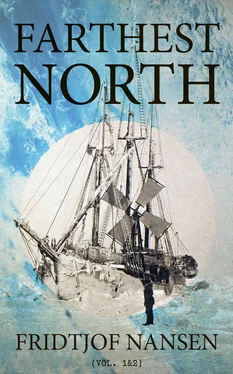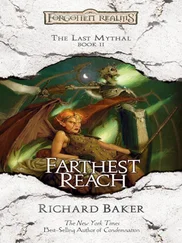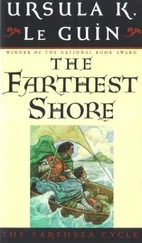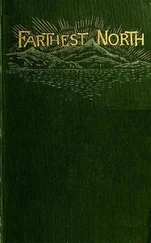Terrible disaster in the cook’s galley! Mogstad goes in and sees the whole wall sprinkled over with dark-red stains—rushes off to Nordahl, and says he believes Juell has shot himself through despair at the insufferable heat he complains so about. “Great revolver disaster on board the Fram ! …” On close inspection, however, the stains appeared to proceed from a box of chocolate that had upset in the cupboard.
Owing to the fog we dared not go too near land, so kept out to sea, till at last, towards morning, the fog lifted somewhat, and the pilot found his bearings between Farsund and Hummerdus. We put into Lister Fjord, intending to anchor there and get into better sea trim; but as the weather improved we went on our way. It was not till the afternoon that we steered into Ekersund, owing to thick weather and a stiff breeze, and anchored in Hovland’s Bay, where our pilot, Hovland, 1lived. Next morning the boat davits, etc., were put in good working order. The Fram , however, was too heavily laden to be at all easy in a seaway; but this we could not alter. What we had we must keep, and if we only got everything on deck shipshape and properly lashed, the sea could not do us much harm, however rough it might be; for we knew well enough that ship and rigging would hold out.
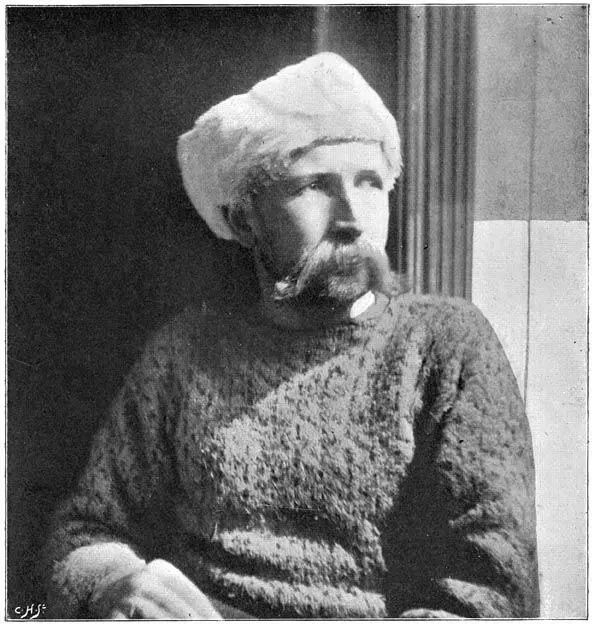
Adolf Juell
( From a photograph taken in December, 1893 )
It was late in the evening of the last day of June when we rounded Kvarven and stood in for Bergen in the gloom of the sullen night. Next morning when I came on deck Vågen lay clear and bright in the sun, all the ships being gayly decked out with bunting from topmost to deck. The sun was holding high festival in the sky—Ulriken, Flöiren, and Lövstakken sparkled and glittered, and greeted me as of old. It is a marvellous place, that old Hanseatic town!
In the evening I was to give a lecture, but arrived half an hour too late. For just as I was dressing to go a number of bills poured in, and if I was to leave the town as a solvent man I must needs pay them, and so the public perforce had to wait. But the worst of it was that the saloon was full of those everlastingly inquisitive tourists. I could hear a whole company of them besieging my cabin door while I was dressing, declaring “they must shake hands with the doctor!” 2One of them actually peeped in through the ventilator at me, my secretary told me afterwards. A nice sight she must have seen, the lovely creature! Report says she drew her head back very quickly. Indeed, at every place where we put in we were looked on somewhat as wild animals in a menagerie. For they peeped unceremoniously at us in our berths as if we had been bears and lions in a den, and we could hear them loudly disputing among themselves as to who was who, and whether those nearest and dearest to us whose portraits hung on the walls could be called pretty or not. When I had finished my toilette I opened the door cautiously and made a rush through the gaping company. “There he is—there he is!” 3they called to each other as they tumbled up the steps after me. It was no use; I was on the quay and in the carriage long before they had reached the deck.
At 8 o’clock there was a great banquet, many fine speeches, good fare and excellent wine, pretty ladies, music, and dancing till far into the night.
Next morning at 11 o’clock—it was Sunday—in bright, sunshiny weather, we stood northward over Bergen Fjord, many friends accompanying us. It was a lovely, never-to-be-forgotten summer day. In Herlö Fjord, right out by the skerries, they parted from us, amid wavings of hats and pocket-handkerchiefs; we could see the little harbor boat for a long while with its black cloud of smoke on the sparkling surface of the water. Outside, the sea rolled in the hazy sunlight; and within lay the flat Mangerland, full of memories for me of zoological investigations in fair weather and foul, years and years ago. Here it was that one of Norway’s most famous naturalists, a lonely pastor far removed from the outer world, made his great discoveries. Here I myself first groped my way along the narrow path of zoological research.
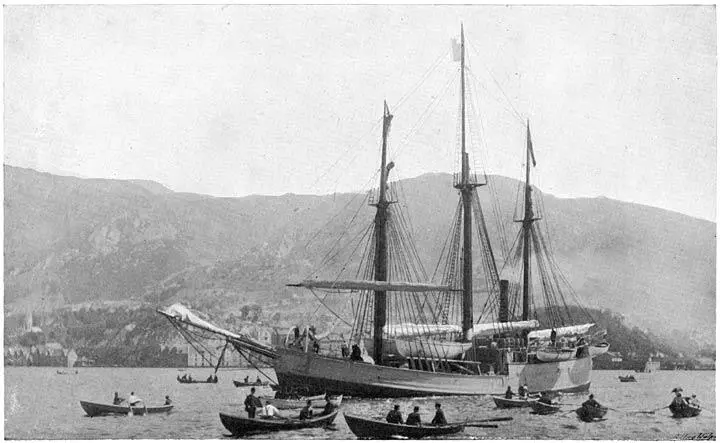
The “Fram” leaving Bergen
( From a photograph )
It was a wondrous evening. The lingering flush of vanished day suffused the northern sky, while the moon hung large and round over the mountains behind us. Ahead lay Alden and Kinn, like a fairyland rising up from the sea. Tired as I was, I could not seek my berth; I must drink in all this loveliness in deep refreshing draughts. It was like balm to the soul after all the turmoil and friction with crowds of strangers.
So we went on our way, mostly in fair weather, occasionally in fog and rain, through sounds and between islands, northward along the coast of Norway. A glorious land—I wonder if another fairway like this is to be found the whole world over? Those never-to-be-forgotten mornings, when nature wakens to life, wreaths of mist glittering like silver over the mountains, their tops soaring above the mist like islands of the sea! Then the day gleaming over the dazzling white snow-peaks! And the evenings, and the sunsets with the pale moon overhead, white mountains and islands lay hushed and dreamlike as a youthful longing! Here and there past homely little havens with houses around them set in smiling green trees! Ah! those snug homes in the lee of the skerries awake a longing for life and warmth in the breast. You may shrug your shoulders as much as you like at the beauties of nature, but it is a fine thing for a people to have a fair land, be it never so poor. Never did this seem clearer to me than now when I was leaving it.
Every now and then a hurrah from land—at one time from a troop of children, at another from grown-up people, but mostly from wondering peasants who gaze long at the strange-looking ship and muse over its enigmatic destination. And men and women on board sloops and ten-oared boats stand up in their red shirts that glow in the sunlight, and rest on their oars to look at us. Steamboats crowded with people came out from the towns we passed to greet us, and bid us God-speed on our way with music, songs, and cannon salutes. The great tourist steamboats dipped flags to us and fired salutes, and the smaller craft did the same. It is embarrassing and oppressive to be the object of homage like this before anything has been accomplished. There is an old saying:
“At eve the day shall be praised,
The wife when she is burnt,
The sword when tried,
The woman when married,
The ice when passed over,
Ale when drunk.”
Most touching was the interest and sympathy with which these poor fisher-folk and peasants greeted us. It often set me wondering. I felt they followed us with fervent eagerness. I remember one day—it was north in Helgeland—an old woman was standing waving and waving to us on a bare crag. Her cottage lay some distance inland. “I wonder if it can really be us she is waving to,” I said to the pilot, who was standing beside me. “You may be sure it is,” was the answer. “But how can she know who we are?” “Oh! they know all about the Fram up here, in every cabin, and they will be on the lookout for you as you come back, I can tell you,” he answered. Aye, truly, it is a responsible task we are undertaking, when the whole nation are with us like this. What if the thing should turn out a huge disappointment!
In the evening I would sit and look around—lonely huts lay scattered here and there on points and islets. Here the Norwegian people wear out their lives in the struggle with the rocks, in the struggle with the sea; and it is this people that is sending us out into the great hazardous unknown; the very folk who stand there in their fishing-boats and look wonderingly after the Fram as she slowly and heavily steams along on her northward course. Many of them wave their sou’-westers and shout “Hurrah!” Others have barely time to gape at us in wonderment. In on the point are a troop of women waving and shouting; outside a few boats with ladies in light summer-dresses, and gentlemen at the oars entertaining them with small-talk as they wave their parasols and pocket-handkerchiefs. Yes; it is they who are sending us out. It is not a cheering thought. Not one of them, probably, knows what they are paying their money for. Maybe they have heard it is a glorious enterprise; but why? To what end? Are we not defrauding them? But their eyes are riveted on the ship, and perhaps there dawns before their minds a momentary vision of a new and inconceivable world, with aspirations after a something of which they know naught. … And here on board are men who are leaving wife and children behind them. How sad has been the separation! what longing, what yearning, await them in the coming years! And it is not for profit they do it. For honor and glory then? These may be scant enough. It is the same thirst for achievement, the same craving to get beyond the limits of the known, which inspired this people in the Saga times that is stirring in them again to-day. In spite of all our toil for subsistence, in spite of all our “peasant politics,” sheer utilitarianism is perhaps not so dominant among us, after all.
Читать дальше
